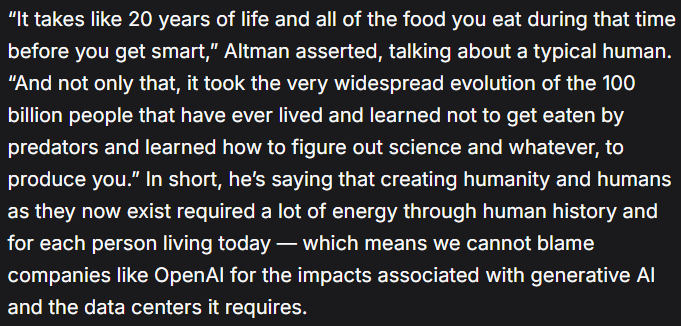We often talk about the first mover advantage, but we rarely talk about the first mover disadvantage, where the one to start the trend is the first to fall.
This video shows why OpenAI and Anthropic are truly in tough spots, compared to Google, …
We often talk about the first mover advantage, but we rarely talk about the first mover disadvantage, where the one to start the trend is the first to fall.
This video shows why OpenAI and Anthropic are truly in tough spots, compared to Google, …
When the prophets of AI say stuff like this, all I hear/read is “I hate humans”.

[Silicon Valley] used to believe it could change the world. Now it just hopes the world won’t change its stock price.
What I’ve heard plenty of: talk about how Anthropic’s “Legal” plugin has disrupted tech, among other industries
What I’ve yet to hear: that the plugin is actually good
Windows 11 is the most pointless “upgrade” ever.
I’ve yet to find any change that justifies the hassle.
And it just feels half baked…like management set an unattainable deadline but then told the developers to push it out …
There’s no point in writing science fiction about AI anymore.
The reality of the situation is unfolding, and it’s far scarier than anything anyone can imagine, if for no other reason than it’s real.
My son sent me a sweet YouTube video, with a totally awesome song in the background.
A new artist he likes, influenced by some of my favorite artists of all time…
Sometimes life is so beautiful in the simplest ways.
i don’t know if sky news is a great source
but i do know (for what it’s worth) i agree with these thoughts on why america would invade venezuela
decided to get my 2026 bingo card post out before something else on it hits:
first creative act of 2026:
printing off the first ‘draft’ of my novel
haven’t touched it in 8 weeks
this baby ain’t gonna revise itself
a wonderful message for 2026 and beyond:
‘Embrace the absurdity, and stop making sense for long enough to actually sense what’s happening here.’
is anyone familiar with grokipedia?
is it as bad as it sounds?
wondering how i should feel that i picked up a backlink from the site
now i can’t talk trash about where ai gets its information from
in the middle of negotiating an oil and gas lease for a personal connection, i asked myself:
would billy bob thorton be proud of me?
in which i ponder:
did you still win if you failed to reach your goal but instead reached a personal milestone?
gonna reinstall bazzite on my rog ally
windows SUCKS in general, but especially for handheld systems
me when using windows: WHAT THE EFF, WINDOWS!
me when using mac: WHAT THE EFF, MAC!
me when using linux: WHAT THE EFF, LINUX!
what i should be saying: WHAT THE EFF, COMPUTER!
all i want for christmas is for that one mariah carey to drive straight off a cliff
we need a multi-pronged approach to fixing the male loneliness epidemic
one tactic i suggest–entertaining yourself via the random texters trying to scam everyone
ignoring them ain’t working, so you might as well have some fun
An unexpected revelation at 34,000 feet:
My individual legacy is mostly done. My legacy now goes through my family.
recently started metal gear solid v: phantom pain
this might end up the best movie i’ve ever played
so many of us act as if the world stacked against us
as if it takes that much to hold us down
most of us can’t even conquer ourselves